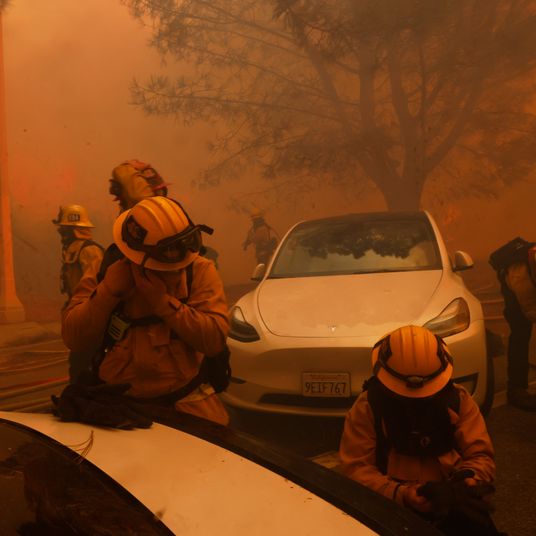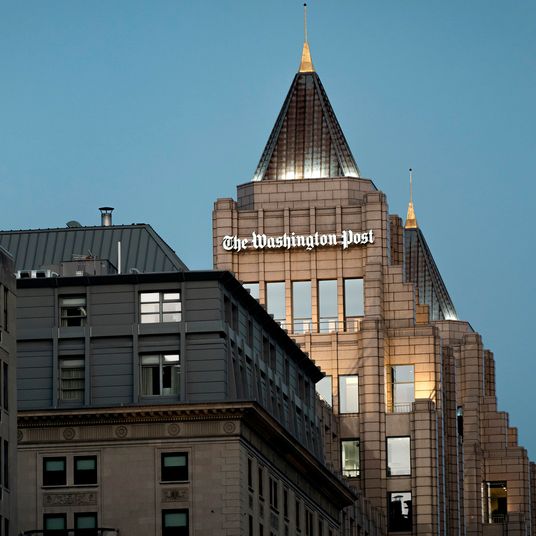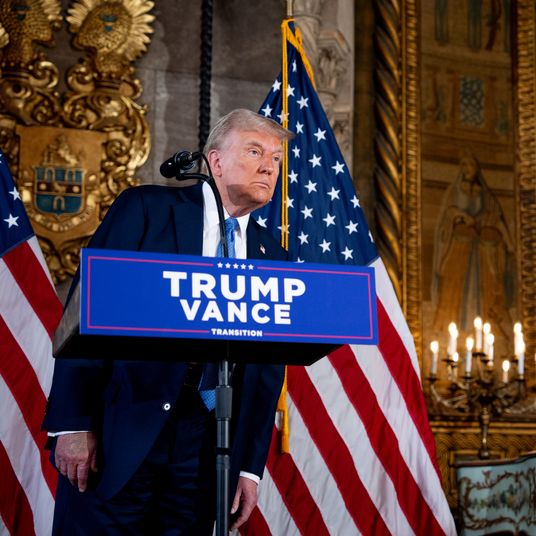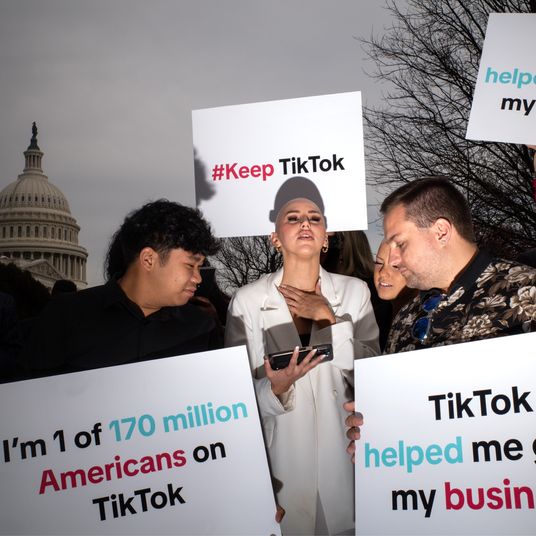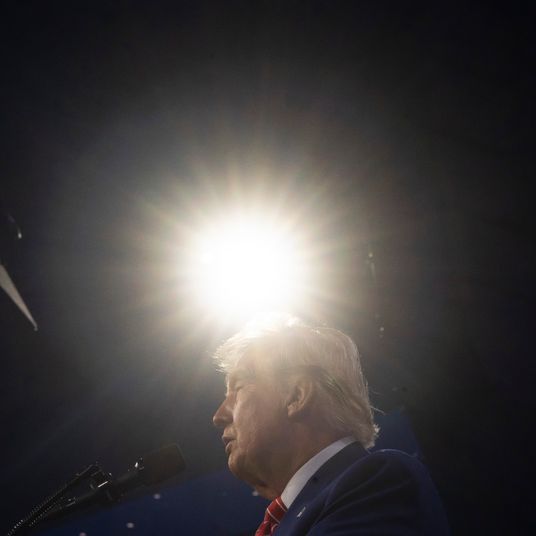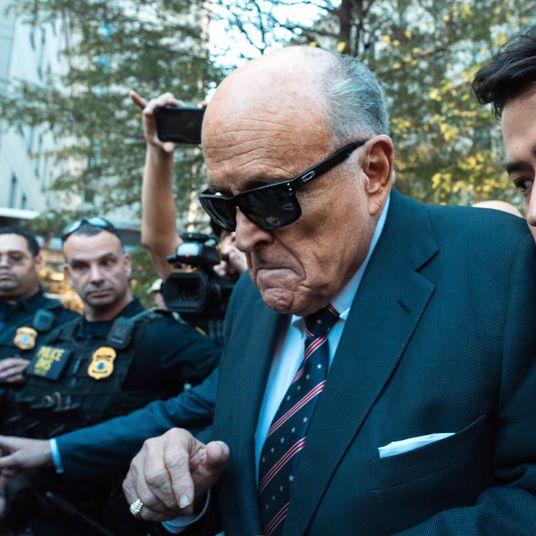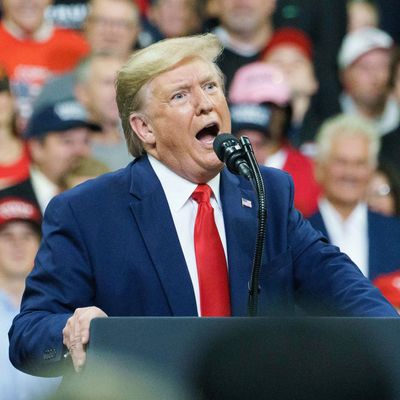
Roughly half an hour into his rally in Minneapolis last night, President Trump was reciting his prepared remarks about the evil political establishment shipping jobs overseas and flooding your communities with drugs and immigrants. As usually happens, Trump grew bored and wandered off script. “I got to tell you, isn’t it much better when I go off script? Isn’t it better?” he said.
When Trump goes off script, he usually starts talking about the one subject that compels his interest and occupies most of his waking hours: television. At this moment in the rally, Trump started riffing on a series of pillow ads he has frequently seen. “Hey folks, the greatest buyer of advertisements in the history of the world, Mike Lindell, My Pillow. I have never seen so many ads,” he began, continuing on about the pillow ads.
This was a completely typical moment in a Trump rally. The president is attempting to manipulate the darkest impulses in the American soul, goading his followers with an authoritarian vision of themselves as a populist uprising against a sinister international conspiracy. But the leader of the movement is simply too bored to stay on topic, and continually changes the channel on his own speech. You can almost see the president relaxing in his Barcalounger, clicking the remote control.
Trump failed as a businessman, but then succeeded playing one on television. During the Obama era, he hit upon a new market in right-wing paranoia, sensing the racial anxieties of aging white America being underserved by a Republican leadership that wanted to talk about budget deficits. He was drawn unexpectedly into the presidency as he chased this audience. And yet he has made it obvious, especially in Minneapolis, that his goal all along was to be talked about favorably on television.
The narrative of Trump’s scripted remarks is about the people’s battle against the establishment. The narrative of Trump’s riffs is about his personal struggle to win positive television coverage. He described his hope that winning the presidency would produce this outcome:
After I won the last election, I said, “Finally it’s okay. Finally I’ll get some great press.” They got worse. They got worse. I said, “Finally, we’re going to get …” I said to the First Lady, “Darling, we’re going to finally get respect. We’re going to finally get media and press coverage. It’s going to be great. Look at what we’ve done.” And I’m telling you, they did, they got worse.
Trump presents himself as a survivor of negative television coverage, persevering with almost superhuman grit in the face of hostile television coverage. The narrators of this heroic struggle are, of course, other people on television:
And Rush Limbaugh, Sean Hannity, a lot of people, the great Mark Levin. We have a lot of great people. Lou Dobbs, great people. You know what they said? Every one of them, plus many others, ‘There’s no other man that we’ve ever met that could have taken it.’ It’s true.
Trump’s narrative of his television coverage is not all self-pity. He also glories in the triumphs. “When Nancy Pelosi was on television the other day,” he told the crowd, describing a tough question the House Speaker fielded in a Sunday morning talk show, “I have to say, I have to say I was very proud of George Stephanopoulos. I was very proud.”
At another moment in the speech, Trump was talking up a supportive local Republican member of Congress, but grew bored again and told the audience that the friendly politician in the audience mattered less than the friendly Republican on TV:
I don’t know why, but with all of the great people I just introduced, for tonight, maybe this is the most important person, because I turned on a very good show in the morning. Fox and friends. They treat us great. I just want fairness. What a great group. Ainsley and Steve, and by the way, Brian has gotten a lot better, right?
Brian was a seven, and he’s getting close to 10 territory, and Steve has been so great, and Ainsley’s just incredible.
At this point, rating the Fox News lineup on a 1–10 scale of Trump sycophancy, Trump launched into a long and almost surreal riff running through nearly the entirety of the network’s pro-Trump personalities:
It might seem like Trump is unable to focus on his text because he is bored with the presidency. The truth is slightly different. He sees the presidency as a means to the end of positive television coverage. Here is Trump describing his great election victory:
That was one of the greatest nights in the history of television … It was one of the highest rated evenings in the history of television. You add up all those networks.
One of the greatest nights in the history of television. The president of the United States thinks of his own election as a show that he watched on TV.








